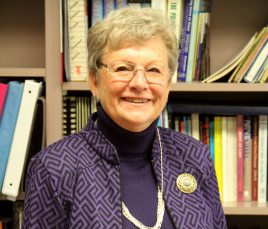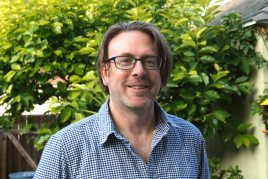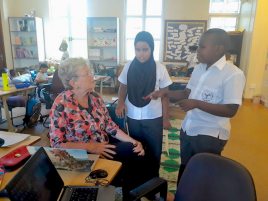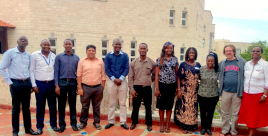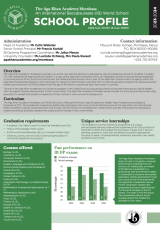Teachers from California State University, Northridge visit Aga Khan Academy Mombasa
"Three weeks at the Aga Khan Academy helped me begin to understand the school and its values. I learned that even when things look different, they are more similar than I might at first think. Particularly important, I learned that racism can be overcome. Respectful contact and interaction is a key. Knowledge and acceptance of difference is a key. Learning to see beyond skin color and dress is a key. Seeing a blue-eyed blond from Tajikistan, an African from northern Kenya, and a Muslim girl wearing a hijab crossing campus, arms linked, chatting happily provided me with hope for our human future."
– Professor Kathleen Rowlands, commenting on her experience at the Aga Khan Academy Mombasa
Trading hemispheres, oceans, and cultures, two California State University, Northridge (CSUN) professors arrived at the Aga Khan Academy Mombasa in May 2018. They visited for a three-week programme designed to provide professional development for the Academy’s teachers and to learn more about the Academy and its teaching methodology.
Excited about her first trip to Africa, Professor Kathleen Rowlands remarked that she is always willing to meet new people and experience different cultures, because "the more people can learn about each other, the safer the planet can become." Her interests coalesce with the Academy’s International Baccalaureate (IB) programme, which emphasises multicultural understanding and awareness. As a professor in secondary education, she has spent more than 20 years educating college students to teach high school English, directs the Cal State Northridge Writing Project, and teaches English Methods for credential candidates, as well as several courses in the English Education MA programme.
Focused on improving student literacy, this visit allowed Professor Rowlands an insight into the Academy's approach to teaching English and creative writing, and to discuss the latest research with the staff. The Academy in Mombasa provides students with an international standard of education, regardless of their socio-economic background, ethnicity, religion or gender. It's emphasis on critical thinking and inquiry-driven student learning reflects CSUN's own approach.
Brian Foley is also a CSUN Professor of Secondary Education and, as the Director of the Educational Technology Master of Arts programme, he has worked with hundreds of teachers on research related to educational technology. His own research looks at applications of technology for science education including gaming and game building for science learning. Professor Foley is particularly impressed with the Academy's diverse student population, its emphasis on training future leaders and on music, the latter being a subject that is increasingly finding less support due to budget constraints in California schools.
"This trip has been an amazing experience for me," said Professor Foley, after his first week in Mombasa. "I have been able to experience a new culture but at the same time find plenty of common ground with teachers who are facing many of the same challenges that we do in California."
This initiative is a result of the Memorandum of Understanding signed in January 2018 between the Academies and CSUN, that calls for collaboration between them in a broad range of activities in education, including lectures, research and training. This project is a result of the Agreement for Cooperation signed between the Ismaili Imamat and the State of California in 2009, whereby both express a commitment of their agencies and institutions to support partnerships in areas of mutual interest, including education, health science, disaster risk management and environmental responsibility.
CSUN currently partners with more than 100 institutions of higher education in 22 countries around the globe and attracts the second-largest international student population of any U.S. Master’s-level institution. Its Michael D. Eisner College of Education College prepares quality educators, administrators and other professionals to serve the needs of the region. CSUN hopes to attract more international students to its programmes, and to expand partnerships with educational institutions of high calibre, such as the Academy, broadening opportunities for CSUN graduates to teach abroad. This collaboration with the Aga Khan Academy Mombasa is the first one undertaken by CSUN on the African continent, and will broaden its knowledge of educational systems in other cultural environments.
The first week of this workshop already made an impact, said Bhagirathy Jhingran, the Academy’s Head of Humanities Department and Geography teacher. "I thoroughly enjoyed myself, and got immersed in the workshop... It was a privilege for my department members to be a part of this workshop. Kathleen Rowlands was very engaging, alert, so well-equipped with materials, ideas, PowerPoints and her sense of humour. She is a powerhouse of ideas and experience. She gave us a 'feel good' factor as teachers and educators."
Duncan Makori, Chemistry and Science Teacher has been just as enthusiastic, remarking on the calm and thoughtful influence of Professor Brian Foley. "His approach to the goals, trends and techniques for teaching in the digital age is commendable." He added, "I look back with appreciation for his brilliance in integrating technology in teaching and learning and am already implementing this in my classes. I hope the Academy, in partnership with CSUN, will bring him back as this will help the whole faculty grow professionally and thus improve teaching and learning."
Jonathon Marsh, Global Manager for Professional Development at the Aga Khan Academies, acknowledged the rewards of the programme. “Having an opportunity to host CSUN faculty members at the Aga Khan Academy in Mombasa has proven to be a very rewarding experience for everyone involved. Having educators come together to share expertise and benefit from a wide array of professional experiences, forged in different national and cultural contexts, is a great example of how pluralism can serve to benefit all. I know the Academy teachers greatly value the practical knowledge and advice they have received from the CSUN Faculty, and by all accounts the visiting faculty members themselves have had a chance to learn and expand their understanding of how good practice may need to be modified and adapted to suit new contexts.”
Partnerships such as the one with CSUN will allow the Academy to maintain its high standards while providing international exposure and experience for CSUN teachers. As Professor Foley noted, "The faculty welcomed me into their classroom, including offering to co-teach their lessons with me. This is a great opportunity for me to learn how the teachers engage their high performing students with the IB curriculum."
In his 2008 Peterson lecture, the Aga Khan noted that "In a world of rapid change, an agile and adaptable mind, a pragmatic and cooperative temperament, a strong ethical orientation – these are increasingly the keys to effective leadership." The emphasis on developing culturally sensitive, ethical leaders who can enact positive change in their societies is a hallmark of the Academies. This focus, not found in most schools in other parts of the world, provided an interesting and different perspective to the CSUN professors.
By Nazim Karim

